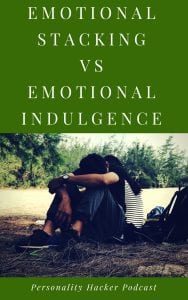Download Episode Here – right click link and select “Save Link As…”
In this episode, Joel and Antonia talk about the difference between letting your emotions stack vs. over-indulging your emotions.
In this podcast you’ll find:
- Letting emotions stack over time until you explode vs. overindulging emotions on a regular basis.
- Neither are expressing emotional health.
- Not a lot of education on what emotional health looks like.
- There is a trend toward Thinkers allowing emotions to stack vs. Feelers who may tend to overindulge in feelings.
- We as humans spend a lot of time and energy trying to manage emotions and relationships.
- Emotional stacking happens when we continually invalidate the emotions that come up. We aren’t letting them go; they are still there, and they will keep piling up until there is a breaking point. The pressure must be relieved. Usually, comes out as an explosion or meltdown.
- You know that you’ve experienced this if you have ever just lost your mind on someone else (or vice versa), and there is no logical reason for it.
- It’s the straw that breaks the camel’s back.
- Some people fear their emotions. They fear being controlled by them.
- Try to figure out how much more something irritates you the second time you encounter it. If it irritates you more, you are stacking.
- The reason emotions stack for Feelers is because we want to give the people we love a pass. We don’t want to make a big deal about our emotions.
- Feelers also don’t want to be considered emotionally erratic.
- Women Feelers don’t want to play into the stereotype of the hysterical female.
- Male Feelers don’t want to have their masculinity called into question by emoting.
- People feel like emotions happen to them. They are on the receiving end of something that is out of control.
- Overindulgence comes when someone gets the attention they want every time they emote. So, they develop a strategy to use this to become the highest status person in the room. Extraverted Feeling wants to get people’s needs met. The person with the most needs is the highest status individual.
- If you perpetually stay in the position as the person who always has the most needs, your group will hemorrhage you out.
- Because we are in a society that sees emotions as being out of control, then the person who is showing the most heightened version of negative emotion appears the most in control because everyone else dances to their fiddle.
- Emotional self-indulgence is usually about power and status.
- If you think your emotions are everybody else’s problem, you are officially in an emotionally overindulgent space.
- So are stackers better than self-indulgers?
- No. Two sides of the same coin. One often leads to the other.
- Sometimes we trick ourselves into believing that stacking is the noblest strategy. That is not reality.
- Learn to process your emotions in a more real-time manner.
- Pay attention to your body. Are you clenching your teeth? Are your shoulders up around your ears? Is your stomach fluttering?
- Set reminders throughout the day to check in.
- You have probably created a portion of your identity around not being emotional. You may think that makes you more low maintenance, which you have told yourself is desirable.
- You may have to take an ego hit if you start expressing the emotions.
- All personal development comes from being not you and taking hits to your ego.
- This doesn’t mean you have to lose it completely. You can still make the choice to accept the little moments to avoid the big explosion.
- People who overindulge in emotion are often looking for validation from the outside world. They either want the outside world to fix the problem or are looking for confirmation that what they are feeling is appropriate.
- Work on self-validation. Don’t expect others to validate you. Every emotion doesn’t need a dog and pony show. Decide what emotion to express and what emotion to let go.
- Don’t be an emotional bully.
- Sometimes we lack the courage to confront the person causing the problem.
- What do you do when you’re caught in the grip? Change something. Go for a walk. Get a snack. If you’re in a car, stop and get out for a few minutes.
- Emotions can bring us into the present. This may explain why they become addictive to some people because they make us so aware. Meditation can do the same thing without the extreme highs and lows.
To subscribe to the podcast, please use the links below:
Subscribe with iTunes
Non iTunes Link
Download The Android App
Subscribe on Soundcloud
Subscribe with Stitcher
If you like the podcast and want to help us out in return, please leave an honest rating and review on iTunes by clicking here. It will help the show and its ranking in iTunes immensely! We would be eternally grateful!
Want to learn more?
Discover Your Personal Genius
We want to hear from you. Leave your comments below…



Share:
Podcast - Episode 0136 - Weight Loss For Personal Development
Podcast - Episode 0138 - Can You Control Your Emotions?
12 comments
teach me pls
Sense and Sensibility by Jane Austen is basically about this difference. Jane Austen leans toward favouring a degree of Emotional Stacking over Emotional Indulgence, but in the end I feel like she promotes a healthy relationship with emotions: your emotions are valid, the behaviours you present to the world may not be.
I was an emotionally indulgent child. I learnt the hard way that people don’t like that all too much, even if it gets you some initial care and attention. So I learnt to stack. And I’ve pretty much been a stacker ever since. The idea of not stacking anymore is connected to the fear of once again being socially rejected, but I am learning to separate the two things, and to express my needs in a constructive way.
Thanks for another great podcast!
Apologies for the errors! Didn’t spell check before posting! And couldn’t find how to edit afterwards.
I certainly know how to hold the floor with emotions. And yes, I never intend to, I always though look for validation from outside not bring Hardin myself, but looking at what I do straight in the face and naming it. It’s really hard, as an ESFJ, to cool down, become self aware of my extroverted feelings. I wasn’t really emotionally validated as a child, so this really helps me to understand (not blame) where this is all coming from. So thank you!
What a great podcast! This would have been helpful to me about a decade ago, although I don’t think I was emotionally mature enough yet to have understood or admitted that what I was doing was unhealthy. I’m an ISTJ and have a tendency to stack my emotions because at my most basic core I see emotions as useless since they aren’t logical. I have to consciously tell myself this is not the case and that although they aren’t logical in the usual sense, it does follow some sort of logic which I’ve dubbed emotional logic in my mind. So when a situation occurs that upsets me, my natural inclination is to say, “it’s not logical for me to feel this way, therefore I shouldn’t and I won’t.” Nowadays, although that voice is still present in my head there is now another voice in my head that tells me, "your feelings are valid and logical, per emotional logic. " I then go into analytical mode and try to figure out the root of my feelings, which usually help me calm down enough to figure out how to address it. It may sound strange but because I am not naturally in tune with my emotions, this is the only way I know how to tune in before it overflows on me.
Thanks again for this podcast and others that are helping me with my EQ.